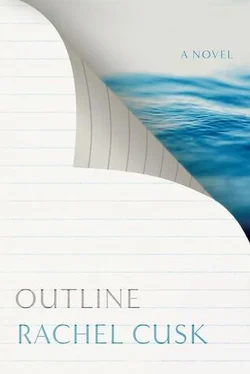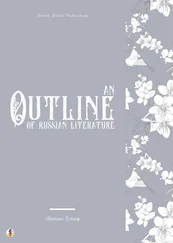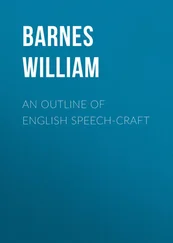More what? I asked.
‘More — life,’ he said, opening his hands in a gesture of receipt. ‘And more affection,’ he added, after a pause. ‘I wanted more affection.’
He replaced the photograph of his parents in his wallet. There was now blackness at the windows. In the cabin people were reading, sleeping, talking. A man in long baggy shorts walked up and down the aisle jiggling a baby on his shoulder. The plane seemed stilled, almost motionless; there was so little interface between inside and outside, so little friction, that it was hard to believe we were moving forward. The electric light, with the absolute darkness outside, made people look very fleshly and real, their detail so unmediated, so impersonal, so infinite. Each time the man with the baby passed I saw the network of creases in his shorts, his freckled arms covered in coarse reddish fur, the pale, mounded skin of his midriff where his T-shirt had ridden up, and the tender wrinkled feet of the baby on his shoulder, the little hunched back, the soft head with its primitive whorl of hair.
My neighbour turned to me again, and asked me what work it was that was taking me to Athens. For the second time I felt the conscious effort of his enquiry, as though he had trained himself in the recovery of objects that were falling from his grasp. I remembered the way, when each of my sons was a baby, they would deliberately drop things from their high chair in order to watch them fall to the floor, an activity as delightful to them as its consequences were appalling. They would stare down at the fallen thing — a half-eaten rusk, or a plastic ball — and become increasingly agitated by its failure to return. Eventually they would begin to cry, and usually found that the fallen object came back to them by that route. It always surprised me that their response to this chain of events was to repeat it: as soon as the object was in their hands they would drop it again, leaning over to watch it fall. Their delight never lessened, and nor did their distress. I always expected that at some point they would realise the distress was unnecessary and would choose to avoid it, but they never did. The memory of suffering had no effect whatever on what they elected to do: on the contrary, it compelled them to repeat it, for the suffering was the magic that caused the object to come back and allowed the delight in dropping it to become possible again. Had I refused to return it the very first time they dropped it, I suppose they would have learned something very different, though what that might have been I wasn’t sure.
I told him I was a writer, and was going to Athens for a couple of days to teach a course at a summer school there. The course was entitled ‘How to Write’: a number of different writers were teaching on it, and since there is no one way to write I supposed we would give the students contradictory advice. They were mostly Greeks, I had been told, though for the purposes of this course they were expected to write in English. Other people were sceptical about that idea but I didn’t see what was wrong with it. They could write in whatever language they wanted: it made no difference to me. Sometimes, I said, the loss of transition became the gain of simplicity. Teaching was just a way of making a living, I continued. But I had one or two friends in Athens I might see while I was there.
A writer, my neighbour said, inclining his head in a gesture that could have conveyed either respect for the profession or a total ignorance of it. I had noticed, when I first sat down beside him, that he was reading a well-thumbed Wilbur Smith: this, he now said, was not entirely representative of his reading tastes, though it was true he lacked discrimination where fiction was concerned. His interest was in books of information, of facts and the interpretation of facts, and he was confident that he was not unsophisticated here in his preferences. He could recognise a fine prose style; one of his favourite writers, for example, was John Julius Norwich. But in fiction, admittedly, he was uneducated. He removed the Wilbur Smith from the seat pocket, where it still remained, and plunged it into the briefcase at his feet so that it was out of sight, as though wishing to disown it, or perhaps thinking that I might forget I had seen it. As it happened I was no longer interested in literature as a form of snobbery or even of self-definition — I had no desire to prove that one book was better than another: in fact, if I read something I admired I found myself increasingly disinclined to mention it at all. What I knew personally to be true had come to seem unrelated to the process of persuading others. I did not, any longer, want to persuade anyone of anything.
‘My second wife,’ my neighbour said presently, ‘had never read a book in her life.’
She was absolutely ignorant, he continued, even of basic history and geography, and would say the most embarrassing things in company without any sense of shame at all. On the contrary, it angered her when people spoke of things she had no knowledge of: when a Venezuelan friend came to visit, for instance, she refused to believe that such a country existed because she had never heard of it. She herself was English, and so exquisitely beautiful it was hard not to credit her with some inner refinement; but though her nature did contain some surprises, they were not of a particularly pleasant kind. He often invited her parents to stay, as though by studying them he might decipher the mystery of their daughter. They would come to the island, where the ancestral home still remained, and would stay for weeks at a time. Never had he met people of such extraordinary blandness, such featurelessness: however much he exhausted himself with trying to stimulate them, they were as unresponsive as a pair of armchairs. In the end he became very fond of them, as one can become fond of armchairs; particularly the father, whose boundless reticence was so extreme that gradually my neighbour came to understand that he must suffer from some form of psychic injury. It moved him to see someone so injured by life. In his younger days he almost certainly wouldn’t even have noticed the man, let alone pondered the causes of his silence; and in this way, in recognising his father-in-law’s suffering, he began to recognise his own. It sounds trivial, yet it could almost be said that through this recognition he felt his whole life turning on its axis: the history of his self-will appeared to him, by a simple revolution in perspective, as a moral journey. He had turned around, like a climber turns around and looks back down the mountain, reviewing the path he has travelled, no longer immersed in the ascent.
A long time ago — so long that he had forgotten the author’s name — he read some memorable lines in a story about a man who is trying to translate another story, by a much more famous author. In these lines — which, my neighbour said, he still remembers to this day — the translator says that a sentence is born into this world neither good nor bad, and that to establish its character is a question of the subtlest possible adjustments, a process of intuition to which exaggeration and force are fatal. Those lines concerned the art of writing, but looking around himself in early middle age my neighbour began to see that they applied just as much to the art of living. Everywhere he looked he saw people as it were ruined by the extremity of their own experiences, and his new parents-in-law appeared to be a case in point. What was clear, in any case, was that their daughter had mistaken him for a far wealthier man: the fatal yacht, on which he had hidden out as a marital escapee and which was his sole remaining asset from that time, had lured her. She had a great need for luxury and he began to work as he never had before, blindly and frantically, spending all his time in meetings and on airplanes, negotiating and securing deals, taking on more and more risk in order to provide her with the wealth she took for granted was there. He was, in effect, manufacturing an illusion: no matter what he did, the gap between illusion and reality could never be closed. Gradually, he said, this gap, this distance between how things were and how I wanted them to be, began to undermine me. I felt myself becoming empty, he said, as though I had been living until now on the reserves I had accumulated over the years and they had gradually dwindled away.
Читать дальше












